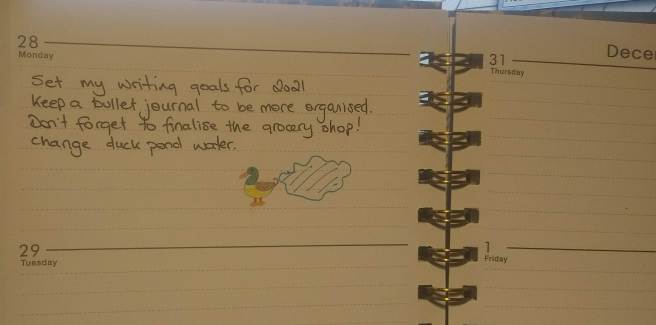As New Year approaches, it’s time to make resolutions. We all know these flop, however, so many writers now set goals instead.
What’s the difference? A resolution is a promise to yourself to do or not do something: I will lose weight, I will join the gym, I will swear less, for example. A goal is a specific target: ‘I want to fit into that size 12 dress in time for Auntie’s wedding’ or ‘I want a six-pack’.

Goals work better because they are to a greater or lesser degree SMART—Specific, Measurable, Agreed, Realistic and Timed. In other words, we know exactly what we want to achieve, when we wish to achieve it, and those around us agree it’s doable.
Let’s say you vow to join a gym and actually do that on January 2nd. Then what? You’ll probably go regularly for a month before attendances tail off. Why does that happen? Because you have no endpoint, something to keep up your motivation. It becomes a thankless chore. But if you’d said: “I will join the gym to take the recommended 150 minutes of aerobic exercise and 2 sessions of strength-building per week and so reduce my heart attack risk.” you will know if you’re hitting that target week by week. On the other hand, it is an open goal. When do you stop? Do you know what your heart attack risk is? Will you inadvertently increase your risk by rewarding yourself after each session by going for coffee (with cream and marshmallows) and cake with friends? So it would be better to be even more specific.
The same goes for writing goals. Vowing (or resolving) to ‘write more’ is doomed to failure because it assumes you know how much you write now, and are you talking about words, hours or finished projects? In other words, how do you measure how much you write? How will you know if you are writing more?
Making your goals SMART brings focus and clarity.
| Resolution | Goal |
|---|---|
| I will write more | I will write 100 words a day at least 5 days a week |
| I will focus on short stories | I will submit at least 3 short stories this year |
| I will do NaNoWriMo | I will write 50K during NaNoWriMo having first completed the planning stages on the website so I have a plot to go |
| I will spend less time on social media | I will disconnect from the internet during my designated writing sessions |
As a result of my SMART(ish) goals last year, I sold two pocket novels and more than paid for my Writer’s Forum sub from published First Draft columns.
One goal failed. I did not find new homes for old stories for three reasons. First, I have concentrated on writing pocket novels. Second, I stopped writing for several months during lockdown. Third, WOMAG markets contracted: That’s Life Australia stopped publishing fiction and The Weekly News folded. That’s fine. Life happens. Lot’s of people had their plans thwarted this year by a certain virus.
Another goal was so easily achieved it was pointless. I wrote ‘consider a serial for The People’s Friend’. I did that in 2 seconds: ‘Yep, could do, but I won’t.’

These are my writing goals for 2021. The default deadline is Dec 31st 2021, but I have chosen a different date for some because allowing a full year will encourage me to procrastinate.
- Learn to use the dreaded WordPress block editor before I lose my sanity
- Develop a new idea for a pocket novel for My Weekly, write the first draft during Camp Nano in April. Ideally, submit it to Maggie by September.
- Submit a story to My Weekly (a new market for me) every submission period.
- Write and submit a synopsis for a serial for The People’s Friend by December.
- Write in my lovely new week-to-view planner at least 5 days a week.
- Earn more than last year
This list is not exclusive, but I will concentrate my writing efforts here.
Now it’s your turn: what SMART goals will you set yourself for next year? Don’t go mad and pick something totally unachievable. You won’t write 5000 words every day, I guarantee it! Don’t set yourself up to fail—it’s dispiriting. ‘Write something every day even if it’s just a shopping list’ will do. 100 words is the length of this paragraph—something most people can rattle off at the end of a busy day. The important thing is that it means something to you and you know you can do it with the right motivation, time and support.

